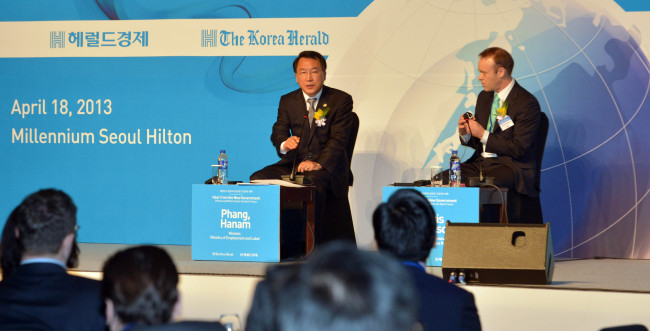Foreign executives briefed on new policies
Labor minister, officials address Korea Herald forum on policies of new government
By Korea HeraldPublished : April 18, 2013 - 21:06
A special forum hosted by Herald Corp. was held in Seoul on Thursday to offer a better understanding of President Park Geun-hye’s key policies to the foreign business community.
About 100 foreign business executives from multinational companies and financial groups gathered for the “Hear from the New Government” forum where senior Korean officials of the new government introduced Park’s new policy directions and goals.
The list of speakers included Phang Ha-nam, Minister of Employment and Labor, Choi Sang-mok, director of the economic policy bureau at the Ministry of Strategy and Finance, and Tchoe Byong-ho, president of the Korea Institute for Health and Social Affairs.
About 100 foreign business executives from multinational companies and financial groups gathered for the “Hear from the New Government” forum where senior Korean officials of the new government introduced Park’s new policy directions and goals.
The list of speakers included Phang Ha-nam, Minister of Employment and Labor, Choi Sang-mok, director of the economic policy bureau at the Ministry of Strategy and Finance, and Tchoe Byong-ho, president of the Korea Institute for Health and Social Affairs.

At the forum, Labor Minister Phang stressed that the new government will step up efforts to make the country’s labor market more flexible. But the government will also pursue a job market that offers “equal opportunities” for more laborers based on the principle of coexistence, Phang added.
Asked whether the Korean government is willing to ease its measures that protect workers from being laid off, the new Labor Minister said, “We are aware of the concern ... but the Korean government thinks that the inflexible relationship between labor and management, and inflexible recruitment (practices) are (major) hurdles to creating new jobs.”
On economic policy, Choi said the government will aim to achieve 4 percent growth by implementing economic stimulus plans this year.
In addition to the Korean government’s ambitious plan to expand its welfare sector, Tchoe of KIHASA said it would also make a substantial investment in the country’s biomedical sector over the next five years. The plan will be an opportunity for foreign firms to form partnerships with Korean companies, he added.
On tax reforms, Kim Jae-jin, senior fellow at the Korea Institute of Public Finance, presented the government’s new policy on reducing tax exemptions and toughening tax measures against the underground economy. In addition, Ko Seung-bum, director of the financial policy bureau at the Financial Services Commission, provided a closer look into President Park’s financial reform plans.
Participants welcomed Korea’s new policy drive toward boosting the welfare of the people and developing a creative economy.
However, some questioned the government’s ability to fund the ongoing welfare expansion, particularly when it struggles to find new sources of income. Park’s welfare initiative is estimated to cost over 40 trillion won this year.
“The ability of the government to fund (new welfare policies) will be a bit challenging,” said Henry An, cochair of the American Chamber of Commerce’s taxation committee.
An added that the idea of securing tax revenue from the underground economy, which has yet to be brought to the surface, seems “a little nave.”
“In theory it makes sense. But from a practical point of view, I think it is a little bit hard to implement,” he said.
By Cho Chung-un (christory@heraldcorp.com)
-
Articles by Korea Herald








![[Graphic News] More Koreans say they plan long-distance trips this year](http://res.heraldm.com/phpwas/restmb_idxmake.php?idx=644&simg=/content/image/2024/04/17/20240417050828_0.gif&u=)
![[KH Explains] Hyundai's full hybrid edge to pay off amid slow transition to pure EVs](http://res.heraldm.com/phpwas/restmb_idxmake.php?idx=644&simg=/content/image/2024/04/18/20240418050645_0.jpg&u=20240419100350)






![[From the Scene] Monks, Buddhists hail return of remains of Buddhas](http://res.heraldm.com/phpwas/restmb_idxmake.php?idx=652&simg=/content/image/2024/04/19/20240419050617_0.jpg&u=20240419175937)

![[KH Explains] Hyundai's full hybrid edge to pay off amid slow transition to pure EVs](http://res.heraldm.com/phpwas/restmb_idxmake.php?idx=652&simg=/content/image/2024/04/18/20240418050645_0.jpg&u=20240419100350)

![[Today’s K-pop] Illit drops debut single remix](http://res.heraldm.com/phpwas/restmb_idxmake.php?idx=642&simg=/content/image/2024/04/19/20240419050612_0.jpg&u=)